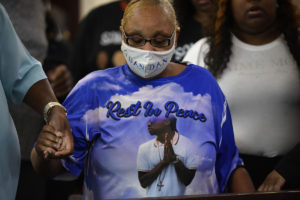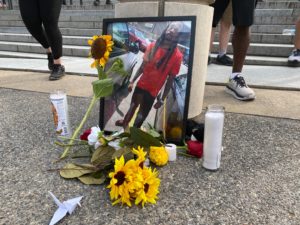
Vickie Hambrick clutched her attorney’s hand as she walked to the front of the courtroom. Her son, Daniel Hambrick, was close to her heart, emblazoned on a royal blue T-shirt that read, “Rest In Peace Dan Dan.”
 Courtesy Tennessean Via Pool
Courtesy Tennessean Via Pool Vickie Hambrick enters the courtroom where Andrew Delke pleads guilty to manslaughter on July 2, 2021, for the 2018 killing of her son Daniel Hambrick.
Attorney Joy Kimbrough wrapped her arm around Vickie Hambrick’s shoulder and whispered in her ear. Then she told the judge she’d be reading a statement on the grieving mother’s behalf.
“On June 1, 1993, I gave birth to Daniel Edward Hambrick,” Kimbrough read. “He was my only child and the love of my life.”
Barely two months after Daniel Hambrick’s 25th birthday, he was shot to death by a Nashville police officer during a foot chase in 2018. That officer would become the first in the city’s history to be charged with murder for an on-duty shooting.
But nearly three years after her son’s killing, Hambrick said she was still waiting for justice. She’d found out the day before that the prosecution had offered Andrew Delke a plea deal for voluntary manslaughter and a three-year sentence. Delke had accepted. But before the judge signed off on the agreement, Hambrick had one final chance to urge him not to.
“There’s not one hour that goes by that I do not think of Daniel,” Hambrick’s attorney read. “Even though I have friends and family, there’s a void in me that cannot be filled. Nothing and no one compares to my precious son.”
In the statement, Hambrick said that she was angry. Mad. Disgusted. She prayed that no other mother would have to endure what she had. And she said that she was against the plea deal, which she called a “backroom bargain.”
 Courtesy Tennessean Via Pool
Courtesy Tennessean Via Pool Andrew Delke listens to victim impact statements from the family of Daniel Hambrick as he pleads guilty to manslaughter on July 2, 2021, for the 2018 killing of Hambrick.
As Hambrick’s lawyer addressed the judge, a heaviness hung over the courtroom. On one side, Delke sat sullenly, flanked by his defense team, relatives and supporters from the Fraternal Order of Police. On the other, Hambrick’s family and friends held one another and wiped away tears. Occasionally, they clapped or grumbled in agreement, as Hambrick’s words grew stronger and Kimbrough’s delivery more impassioned.
Demonstration before hearing
Emotions were running high from the start of the day. Loved ones and advocates for criminal justice reform gathered early outside the Justice A.A. Birch Building, filling the street with chants of, “No justice, no peace.” Then they crowded into the hallway outside Judge Monte Watkins’ courtroom, waiting anxiously to be let in.
After the family was escorted inside, they quickly burst back out through the wooden doors, the mother in tears. Both sides had agreed ahead of time not to wear any clothing with political statements. Someone’s shirt didn’t pass muster. They adjusted in the bathroom and filed back in again, as the crowd in the hallway applauded.
Throughout the hearing, those in the pews continued to voice their support, quietly at first. They clapped in agreement as Hambrick criticized prosecutors and defense attorneys for implying her son’s life was worth only three years and that she was “lucky to get that.”
“We all know that if Daniel had executed Delke by shooting him in the back of his head and in his back and in his buttocks as he ran away, he would be riding on death row, waiting on the electric chair,” Kimbrough read. That’s when those watching a livestream in the hallway started stomping so loudly the floor in the courtroom jury began to shake.
 Samantha Max WPLN News (File)
Samantha Max WPLN News (File)A memorial commemorates the 2018 killing of Daniel Hambrick at a protest in downtown Nashville on July 4, 2020.
Hambrick’s statement criticized the FOP for attacking her son’s character. She said the police department had failed to accept accountability. And she lambasted former District Attorney Torry Johnson’s decision to testify on behalf of the defense “and against the people.”
With the plea deal, she said, the current district attorney, Glenn Funk, had “lost his nerve” and forced the settlement down her throat.
More stomping and clapping. The judge called for order. But Hambrick had more to say.
“I have contempt for this system. I have contempt for this plea. I have contempt for the FOP,” Hambrick’s attorney read. “And I have special contempt for Andrew Delke. May you all rot in hell.”
That concluded the written statements. But then Kimbrough started to speak off the cuff. She begged the judge not to accept the deal, just as she said hundreds of callers from the community had asked her to do in the hours since news broke about the agreement.
“It’s disrespectful to the family. It’s disrespectful to the community,” Kimbrough said. “And it isn’t warranted, based on the facts.”
The attorney said Hambrick’s rights as a victim had been violated when “white men” reached a deal without consulting her. And she told Watkins, who is Black, that he had the power “to do the right thing.”
Kimbrough and Hambrick embraced. Then the mother leaned over the lectern, bowed her head as she caught her breath, and began to whimper.
 Courtesy Tennessean Via Pool
Courtesy Tennessean Via Pool Vickie Hambrick is overcome with emotion as she speaks in court where Andrew Delke pleads guilty to manslaughter on July 2, 2021, for the 2018 killing of her son, Daniel Hambrick.
“My baby,” she cried. “I can’t believe it. I can’t believe this, Judge.”
Hambrick said it over and over, as loved ones rubbed her back and told her to take her time. She banged the table and began to scream.
“I hate you!” Hambrick shrieked, looking at Delke from across the courtroom. “I don’t accept your apology!”
The shouting continued, as three years of emotions spilled out of a woman who had watched her son’s death on video, and who had endured years of legal and political battles, all the while waiting for some sense of closure.
Within moments, the lectern had been pushed to the ground. Arms reached out to hold Hambrick back as she began to reach toward the former officer.
People in the pews rose to their feet. Delke was whisked out of the courtroom. The judge and defense attorneys soon followed.
Hambrick’s daughter wrapped her arms around her mother and pulled her away. Others cried. They yelled. All the while, the district attorney looked on with his hands in his pockets, silent.
Sheila Clemmons Lee, whose son, Jocques Clemmons, was killed by an officer in 2017, is sobbing. So many tears in this room right now. pic.twitter.com/3gn1vLlHyc
— Samantha Max (@samanthaellimax) July 2, 2021
For several minutes, it was unclear exactly what would happen next. Most of the onlookers had left the courtroom and were chanting in the hallway. Delke was nowhere to be found.
But then the former officer and his attorneys came back. Judge Watkins took his seat. He accepted the deal.
“That’ll be it,” Watkins said.
And with that, court was adjourned.
 This story was produced as part of APM Reports’ public media accountability initiative, which supports investigative reporting at local media outlets around the country. Support also came from the Corporation for Public Broadcasting.
This story was produced as part of APM Reports’ public media accountability initiative, which supports investigative reporting at local media outlets around the country. Support also came from the Corporation for Public Broadcasting.


